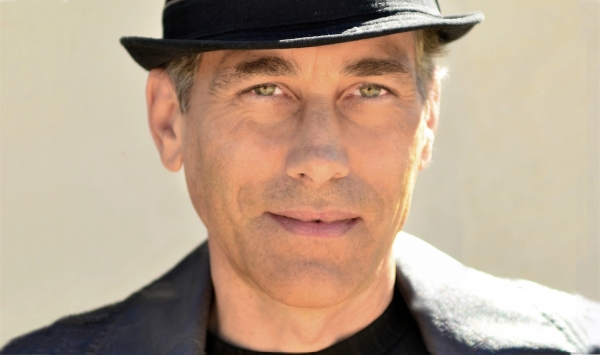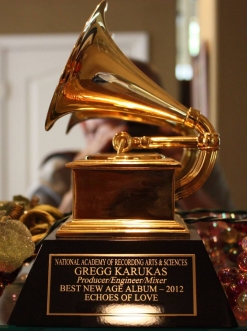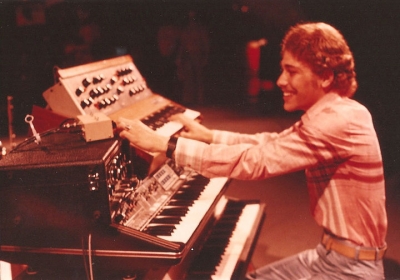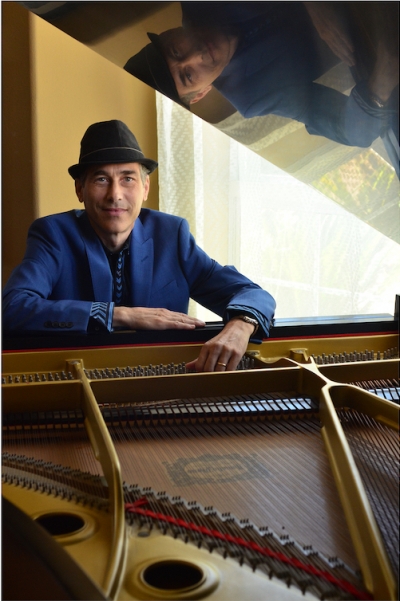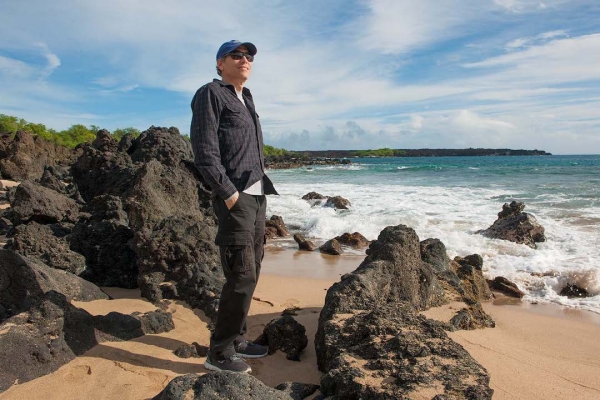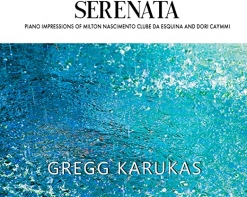
Click on album cover to
go to Kathy's review.
Gregg Karukas is an artist who is musically all over the map as a composer, performer, producer, and more. He recently released his first-ever solo piano album,
Serenata (his 13th album), and it's a beauty! Gregg has produced many, many albums, including two for David Lanz (
Finding Paradise and
The Good Life) and three for Omar Akram, one of which (
Echoes of Love) earned Gregg a Grammy Award. Obviously a very busy musician, Gregg was kind enough to do this interview via email in August 2021.
KP: Hey Gregg! How is your summer going so far?
GK: It's good, and nice to see things opening up a bit.
KP: Yes it is! You recently released your first-ever solo piano album, Serenata. It's your thirteenth album - what took so long for you to go to solo piano?
GK: I have always considered myself a composer first, and then a multi-keyboard player with many styles to try my best to play authentically.......I have an affinity for soulful grooves, emotional and lyrical melodies. I'm pretty self taught, just a little classical training ages 12-15, then I got into jazz. So, I was lucky to pay dues in the Washington, DC club scene playing original contemporary jazz and Brazilian music.......I never spent much time playing solo piano, never any performances, other than one song in the middle of my fairly high energy show. There are so many fantastic solo players that I admire. Everyone from Keith Jarrett to Art Lande, my friends David Lanz and Fred Hersch, Brad Mehldau, Kevin Kern........ With Serenata, I'm a "new arrival", so it is quite a daunting thought to be looking at a 14 song CD that is all solo.....
KP: I absolutely love the album and know it will be one of my favorites for the year (2021). Do you plan to do more solo piano recordings?
GK: I hope so. I think there are many more Brazilian songs I'd love to put my spin on, and I do have more original ideas to flush out.
KP: Serenata is subtitled "Piano Impressions of Milton Nascimento, Clube da Esquina and Dori Caymmi." Tell us about that.
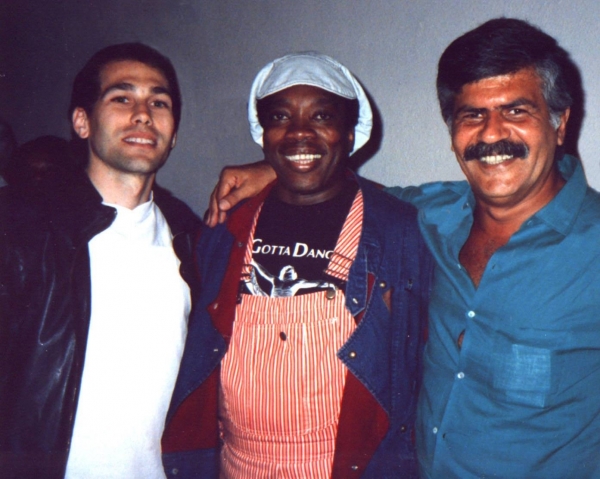
Gregg with Milton Nascimento and Dori Caymmi
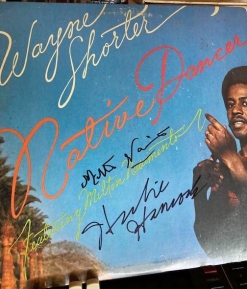
"Native Dancer" cover.
GK: I've been lucky to be associated with so many diverse artists in many genres, and to get hooked up and tour with Sergio Mendes, Ricardo Silveira and Dori Caymmi in the 1990's was a dream come true. I first got turned on to Brazilian music with Jobim's Wave LP as a kid. Then in 1976 a trumpet player in the Air Force jazz band - The Airmen of Note- said, "I think you'd like this new Wayne Shorter LP, Native Dancer, featuring Milton Nascimento". This album changed my life, just as it did for Lyle Mays and Pat Metheny and so many other "jazz musicians". It got me searching for everything Milton Nascimento recorded. Milton's soaring vocals are so distinctive.
Soon after, I was lucky to become friends with the cook at the jazz club in DC who had lived in Brazil. He let me borrow a stack of classic MPB (Music Popular Brazil) LP's from Milton Nascimento, the classic Clube da Esquina LP's, Edu Lobo, Joao Bosco, Chico Buarque, etc. I copied them all to cassettes - still have them, although I have since collected the LP's and CD's of every Milton album. Listening constantly on the way to gigs, the lush melodies and harmonies provided an escape; an antidote to the involved, dynamic jazz fusion that I was writing and playing during that period with Tim Eyermann and East Coast Offering and later, Natural Bridge. I would just let the romantic, wordless melodies, unknown Portuguese lyrics and acoustic textures wash over me, and I deliberately did not try to analyze or learn the songs at the piano......up until very recently, that is.
KP: Interesting! The album's fifteen tracks are a combination of new and "re-imagined" original pieces and pieces by other composers. How did you choose the music?
GK: The classic (and obscure) Brazilian songs were the first ones I gravitated to because they have a very lyrical, romantic quality; not typical samba rhythms or bossa nova. I tried to put a different spin on those songs.
KP: I understand that the original inspiration for the album came from an evening with a box of old cassette tapes. Tell us about that.
GK: All thru my career, I've recorded most of the shows with my little portable recorder. Sometimes I listen right after the gig, sometimes I just put them away........After a recent move, and during pandemic, I discovered a dusty box of live cassette recordings of shows in the 1990's with Dori and Ricardo Silveira and was curious to check out one particular tape marked "Dori - Le Cafe" with a star!!!...... Those Dori shows at that tiny Los Angeles music room were legendary, with everyone from Michel LeGrand, Dave Grusin, Quincy Jones to Wayne Shorter in the audience. I played multiple keys, but Dori usually introduced me as: "My orchestra....". I had to buy a used cassette deck to play it, and it was one of our magical nights. I sat down at the piano and recalled many of his lush, melodic songs as best as I could and got very emotional, especially since I had also recently found the video of our wedding in 1992, where Dori sang “O Cantador” during the ceremony and Milton's "Travessia" was our first dance.
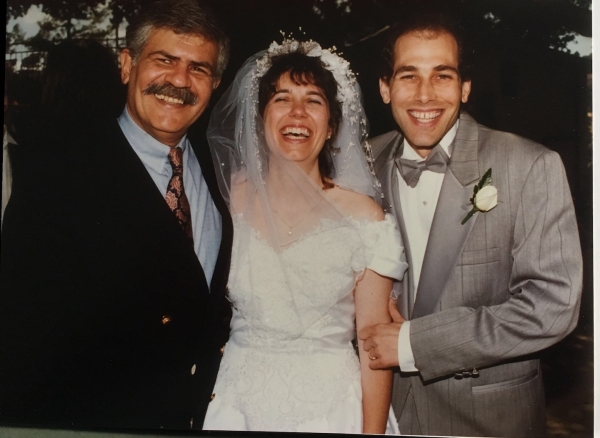
Wedding photo with Dori Caymmi.
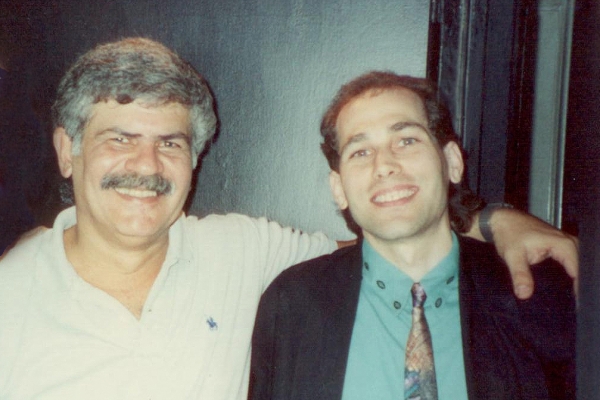
Dori Caymmi and Gregg.
That evening pulled me out of my comfort zone and sent me on a surprising new adventure that I hope will bring some peace and joy to all who are suffering during this challenging time. Once I got into a "zone", I revisited 2 of my solo pieces ("Sound of Emotion" and "Dori's Song") and the rest of the originals are late night, through-composed improvisations.
KP: Most of the music on the album is on the slower, more expressive side, but there is a mix of genres there for sure. In this age of genres and compartmentalization, does that create a problem for charting or finding an audience?
GK: Releasing any new music is a challenge in today's internet world......Yes and no, but I prefer to avoid marketing labels. I would hope there is an audience for this music without it being too pigeonholed or labeled. It's not exclusively world, jazz or new age, but hopefully crosses over a bit. The more people I turn on to Milton and Dori, the better. My established fans have been very complimentary; they know me for being multi-stylistic" anyway, and "new age" people have seemed to "discover" me and welcome my style. It is a crossover of my own brand of expressive piano and a tribute to some great composers.
KP: Congrats on Serenata making its debut at #2 on the Zone Music Reporter chart for February of 2021! The Zone charts are usually more on the new age spectrum, which is basically the category for instrumental (usually!) music that isn't strictly jazz, classical or country. Is the album doing well in the jazz categories, too?
GK: I have gotten some great reviews in the jazz arena too. More to your question before, we decided to promote it in two different "tracks"; for airplay to "new age radio" and for press through a mostly "jazz" PR company to spread out the exposure.
KP: Personally, I'd love to see a genre that is undefinable for music that doesn't fit anywhere else, but I guess that's not at all likely to happen. I really love your distinctive sound and that of some of my other favorite artists who don't usually fit into any specific categories. I guess that can present a marketing nightmare, though.
GK: Yes, a challenge that every artist faces when they prepare a release.
KP: In addition to your own recordings, you have produced and played on many, many more, including albums by David Lanz and Omar Akram. What are some of your recent production projects?
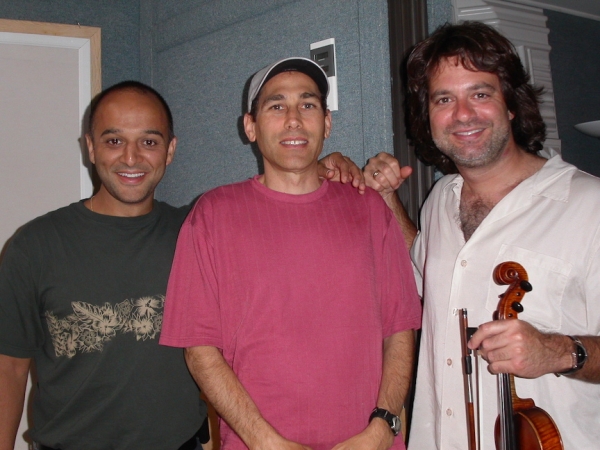
Omar Akram, Gregg and Charlie Bisharat.
GK: Over the decades, I've been part of some great musical projects in many genres. I played all the keyboards on the Rippingtons first LP Moonlighting, and even played most all the synths and bass lines on Rockwell's hit LP Somebody's Watching Me. I've done many track arrangements for Kirk Whalum, Paul Brown, Jessy J......Lately, I am focusing on my own productions, as the inspiration comes.
KP: Which album earned you a Grammy award?
GK: I got the Grammy for Best New Age Album as producer, co-composer, keyboardist, pianist, arranger, and engineer for Echoes of Love, my 3rd collaboration with Omar Akram. It has a hybrid sound of melodic piano, Middle Eastern influences, exotic percussion grooves and dynamic orchestrations supporting some great guests, my old friends violinist Charlie Bisharat, guitarist Ramon Stagnaro, percussionists Brian Kilgore and Melad Youssofi and exotic woodwind player Mark Hollingsworth. Over a 10 year period, I had produced and arranged 3 CD's for Omar, starting with Free as a Bird, which got him signed to the Real Music label. On the 2nd CD, Secret Journey I co-wrote all the songs and, finally, composed and performed the majority of the music on Echoes of Love, so getting the Grammy was especially gratifying.
KP: I've reviewed all of those albums and really enjoyed them!
You've worked with so many of the big names in music. What are some favorite collaborations?
GK: Dori Caymmi, Kirk Whalum, Boney James, Dave Koz, David Lanz, Larry Carlton......so many.
KP: Let's look back a bit and see how you got from Point A to Point C or D. Where were you born and where did you grow up?
GK: Born in Baltimore, MD. I grew up in Bowie, MD, a suburb of Washington, DC. Some other famous Bowie residents: Eva Cassidy, Guitar maker Paul Reed Smith, Kathie Lee Gifford, JC Chasez (Nsync). When bassist Michael Manring decided to leave our band, Natural Bridge, to tour with Michael Hedges (and go on to have a great solo career on Windham Hill), I looked for a change and moved to LA in 1982 at age 26.
KP: When did you start getting interested in music?
GK: Since I saw the Beatles at age 7 and grew up next to my father's roadside tavern with a fully stocked jukebox.
KP: When did you start playing the piano and taking lessons? Or are you self-taught?
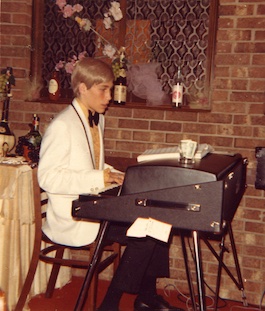
Gregg at The Bowie Inn.
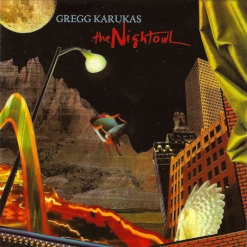
"The Nightowl" cover.
GK: My older brothers took piano lessons, so I wanted to play, too. I never had a steady teacher until age 12-15. I was not very focused, because I bounced between drums, guitar, trumpet and piano, all with a good ear. I would say I'm mostly self taught.
KP: Do you come from a musical family?
GK: Yes, my brothers. My parents didn't play any music.
KP: How old were you when you wrote your first song?
GK: 15, we had a basic "composition course" as extra credit in high school. I still remember it....a kind of new-agey piece.
KP: When did you start playing professionally?
GK: I was very lucky to be asked to join the high school big band at age 15 as the understudy for the piano player who was soon to graduate. We actually played lots of gigs for weddings and bowling parties in our local Bowie, MD community. All the money went into the band fund to pay for our travel to stage band competitions, of which we won quite a few.
At age 16, we formed a little quartet with guitar, me on Fender Rhodes, bass and trumpet and played dinner music at my Dad’s new place, The Bowie Inn. Around that same time, I started playing coffeehouses with my girlfriend, doing Joni Mitchell, Carole King and Laura Nyro songs.
KP: Which instruments do you play, besides piano?
GK: I used to play a little guitar, drums, trumpet. Now I focus on piano and Hammond organ. On my CD's, I play most of the bass parts and program lots of drum parts, unless it is a live rhythm section song.
KP: I've read that when you moved to Los Angeles, your goal was to play as many different styles of music as you could. Tell us about that.
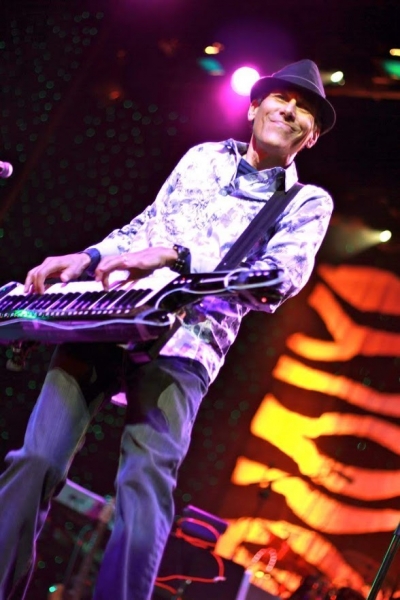
A few years later!
GK: Well, in Maryland/DC, I had been in two successive original jazz/rock/ fusion bands that devoted all our energies to "making it". We eked out our communal rent and had great local success, putting out a couple of projects and opening shows for top artists, but not much national distribution. I really got to write lots of diverse music for those groups. I also did quite a bit of studio work, mostly jingles, which was great training for my future roles as producer/engineer.
When I decided to move West, I felt it was best to not get too caught up in one project, or even think about getting a solo career going. I was lucky to get known as a guy who could handle keys and synths and fit into any other aspiring artist's music. My first gig - thanks to Russell Ferrante’s recommendation- was with established singer /songwriter Shelby Flint ("Angel on My Shoulder," Mercury) at Donte's, the famous jazz club in North Hollywood. Shelby’s band was loved by everybody. Every singer in LA idolized Shelby’s voice and every songwriter idolized her songwriting. She has a very wide range of songwriting styles too. Her band included some of the best musicians in LA: Denny Seiwell from Paul McCartney and Wings; Bill Bodine from Joan Armatrading, Sergio Mendes; Jerry Steinholtz from Lee Ritenour, Diana Ross, and Jerry Peterson from Kim Carnes, Paul Butterfield and Billy Vera. I was in great company and still play with Shelby occasionally. She is featured on many of my CD’s and especially on our holiday acoustic jazz CD Home For The Holidays.
Then, every gig or demo session could lead to another artist who needed tasteful, supportive keyboards. Freelancing. Producing and arranging demos for songwriters in my ever-expanding studio. A few years later, Tim Eyermann recorded my song, "Walkin' With You" and it was on the radio. Eventually, my solo career happened pretty naturally, with the emerging success of my songwriting and the beginnings of what was labeled “New Adult Contemporary” radio, or NAC…….then it became “smooth jazz" for better or worse.
KP: You were one of the founding members of the jazz group, The Rippingtons. How long were you with them?
GK: We played together for about a year as the Russ Freeman Group at the Baked Potato every Monday. Then we recorded the Moonlighting LP music and Russ signed a deal with another company (Passport) and couldn't use his name for contractual reasons, so The Rippingtons were born. That record became a classic and helped the careers of Kenny G., David Benoit, Dave Koz....., me. We toured together for about another year and then I left to promote my first solo CD, The Nightowl in 1988.
KP: Who are some of the other musicians you have toured and recorded with?
GK: Tours: Ronnie Laws, Melissa Manchester, Boney James, Dave Koz (he was one of the first sax players in my group while still a student at UCLA, decades later, I became Musical Director of The Dave Koz and Friends Cruises), Peter White, Rick Braun, Sergio Mendes, Brenda Russell, Alphonse Mouzon, Ricardo Silveira, Dori Caymmi, Larry Carlton.
Recording: Boney James, Dave Koz, David Lanz (produced 2 CD's), Kirk Whalum, Kenia, Gabriella Anders, David Lasley (James Taylor's background vocalist), Peter White, 4 CD’s with Phil Sheeran, Jessy J., Paul Brown, Rick Braun, Richard Elliot, Dianne Shuur, Ricardo Silveira, Dori Caymmi, Rockwell.......TV ("Cheers," "Life Goes On"), Films, many more.
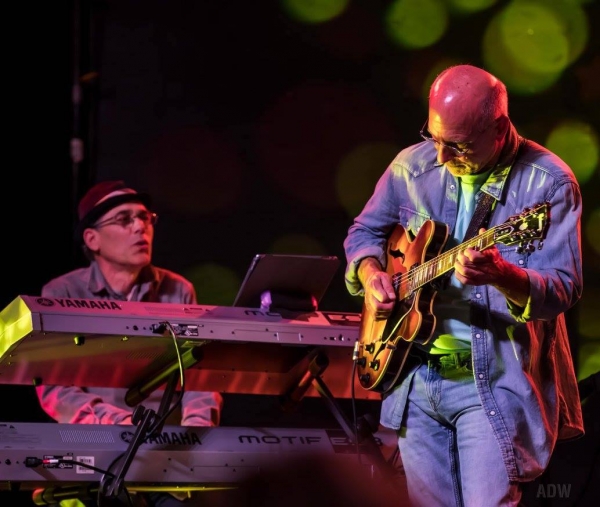
Gregg and Larry Carlton.
KP: Who and what do you consider to be some of your musical influences?
GK: So many influences: Joni Mitchell, Laura Nyro, Herbie Hancock, Todd Rundgren, Richard Tee, Bill Evans, Claus Ogerman, David Sanborn, Chick Corea, Lyle Mays, Joe Sample, George Duke, Keith Jarrett, Joe Zawinul, Frank Zappa, Jimmy Smith, Pat Metheny.
KP: I know you have done some concerts online. Do you miss touring and playing to a live audience?
GK: I miss playing concerts live, but now that things are opening up a bit, everyone is very glad!!
KP: Musicians and audiences!
What has been your most exciting musical experience so far?
GK: I've played the Hollywood Bowl several times...Java Jazz Festival in Jakarta many times....That's always exciting. Probably playing Montreux Jazz Fest. in 1992 with Dori Caymmi. It was Brazil Night presented by Quincy Jones featuring the top artists from Brazil: Milton, Chico Buarque, Gal Costa and the Caymmi Family. The bass player and I were the only Americans on stage that night and the crowd seemed to sing along (in Portuguese) with almost every song.
Also, earlier that day, after our soundcheck, as I was walking back to the hotel by Lake Geneva, I heard an amazing big band sound and walked in on the rehearsal to see my old friend Gil Goldstein with Miles Davis, Quincy Jones, Wallace Rooney and the large Gil Evans Orchestra for their historic revisiting of the "Miles Ahead/Sketches of Spain" music. The live CD of the next night's performance went on to win a Grammy....
KP: Wow! If you could have any three wishes, what would they be?
GK: Have my late wife back........; proper credit and royalties for composers and lastly, to remember all those "great", late night melodies and song ideas that I have forgotten.
KP: What's up next for you?
GK: I'm doing a variety of shows, not crazy traveling as in the past, but a few nice gigs. I just played a couple of cool outdoor shows in Temecula, CA and Flint, MI and have a few dates with guitarist Peter White. I'm really enjoying my latest side-challenge, my Hammond organ group, "The GK Soul Jazz Party". I had never played left hand bass up until a couple of years ago. We are playing a few places and dive bars around Los Angeles. Super fun, you can see us jamming on YouTube.
KP: Is there anything else you'd like to "talk" about?
GK: I want to make sure everyone who loves solo piano knows about Keith Jarrett’s seminal works. The triple LP set: Bremen Lausanne; Koln Concert, Rio and on……All audiophile classics from the ECM label. His impact on music goes way back before he started his improvised “Solo Concerts”, but he has inspired so many and set the standard for decades, though he has recently lost the ability to play.
From my perspective, Keith -with both his European and American groups- and The Paul Winter Consort (and their contemporaries like the group Oregon) are the real foundation of what music lovers call “new age” today. Keith influenced and paved the way for George Winston, David Lanz and so many others; Ralph Towner (from both Paul Winter and later, Oregon) influenced Tommy Emmanuel, Michael Hedges and Will Ackerman. So check them out.
KP: Good advice! Thanks for taking the time, Gregg!!!
For more information about Gregg Karukas and his music, be sure to visit
his website and his
Artist Page here on MainlyPiano.com.
Kathy Parsons
August 2021

